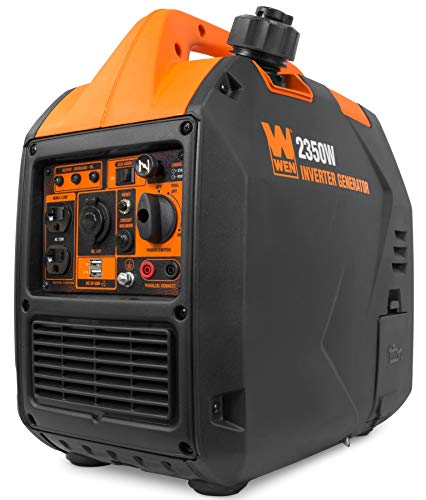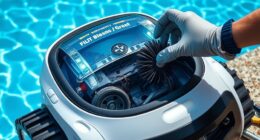In 2025, I've found the 15 best portable generators that meet diverse power needs. I like the Westinghouse 12500 Watt Dual Fuel for its robust performance and remote start feature. The Jackery Solar Generator 1000 v2 stands out for its eco-friendly design and lightweight portability. If you're camping, the WEN 3600-Watt Inverter Generator is a solid choice due to its quiet operation and fuel efficiency. Whether for emergencies or outdoor adventures, these generators offer reliability and versatility. Stick around to see which one might just be the perfect fit for your needs!
Key Takeaways
- Look for generators with dual or tri-fuel capabilities for versatility in fuel options and enhanced convenience during outages or outdoor activities.
- Consider lightweight and portable designs, like Jackery and WEN models, for easy transport during camping or emergency situations.
- Evaluate power output specifications to ensure the generator meets your needs for essential appliances and sensitive electronics.
- Prioritize models with safety features, such as automatic shutdown and built-in monitoring systems, to protect users and devices.
- Research customer feedback on noise levels and operational efficiency to find a generator that operates quietly and is user-friendly.
Westinghouse 12500 Watt Dual Fuel Portable Generator
When it comes to reliable power during emergencies, the Westinghouse 12500 Watt Dual Fuel Portable Generator stands out as a top choice for homeowners and outdoor enthusiasts alike. With an impressive 9500 running watts and 12500 peak watts on gasoline, it can easily power essential appliances during outages. I love the convenience of the remote start feature, allowing me to get it running without hassle. It offers up to 12 hours of run time on a full tank, which is perfect for extended outages. Plus, the dual-fuel capability means I can switch to propane if needed. Assembly was a breeze, taking just 15 minutes, and it's equipped with multiple outlets for flexibility. Overall, it's a solid investment for peace of mind.
Best For: Homeowners and outdoor enthusiasts seeking a reliable power source during emergencies or outages.
Pros:
- Remote start feature allows for convenient operation without manual effort.
- Dual-fuel capability provides flexibility in fuel choice, enhancing usability during emergencies.
- Long run time of up to 12 hours on a full tank ensures sustained power during extended outages.
Cons:
- Some users report that the generator can be noisy, which may be a concern for nearby neighbors.
- It is heavy, making it less portable for some users compared to smaller models.
- Initial setup may require more effort for those unfamiliar with generators, despite clear instructions.
Jackery Solar Generator 1000 v2 with 200W Solar Panel
The Jackery Solar Generator 1000 v2 with a 200W Solar Panel stands out for anyone seeking a reliable, portable power solution for outdoor adventures or emergency situations. With a capacity of 1,070Wh and an impressive AC output of 1,500W, it's perfect for powering appliances like fridges and electric pots. Weighing just 23.8 lbs, it's easy to transport. I love that it charges from 0% to 100% in just one hour, and the Smart App Control lets me manage power efficiently. Plus, the battery lasts over 10 years with proper care. Customer feedback is overwhelmingly positive, highlighting its quiet operation and versatility. Overall, it's an excellent choice for camping, road trips, and off-grid living.
Best For: Outdoor enthusiasts, road trippers, and individuals seeking reliable backup power for emergencies.
Pros:
- Fast charging: Charges from 0% to 100% in just one hour.
- Versatile power options: Can power multiple appliances and devices simultaneously.
- Long battery lifespan: Over 10 years with more than 70% capacity after 4,000 charge cycles.
Cons:
- Missing accessories: Some users reported missing solar charge cable and outlet dust caps.
- App compatibility issues: Certain phones may experience difficulties connecting to the Jackery App.
- Limited DC output options: Suggestions for additional output options for enhanced versatility.
Westinghouse 14500 Peak Watt Tri-Fuel Portable Generator
If you're in need of a dependable power source for home backup or outdoor activities, the Westinghouse 14500 Peak Watt Tri-Fuel Portable Generator stands out with its impressive versatility. With a peak output of 14,500 watts, it easily powers essential appliances during outages. I found the assembly straightforward, and the remote start feature adds a nice touch of convenience. Running on gasoline, propane, or natural gas, it offers flexibility depending on fuel availability. While the generator's performance on propane and natural gas was effective, I did notice some concerns about stability under heavy loads. Overall, it's a solid investment with a robust construction, although you might want assistance moving it due to its weight.
Best For: Homeowners or outdoor enthusiasts looking for a versatile and reliable backup power solution during outages or activities.
Pros:
- Versatile fuel options allow operation on gasoline, propane, or natural gas, providing flexibility based on availability.
- User-friendly features such as remote start and clear instructions enhance convenience and ease of use.
- Long runtime of up to 19 hours on gasoline ensures extended operation during power outages.
Cons:
- Heavy weight may require assistance for transport and setup, making it less portable for some users.
- Higher noise levels than expected could be a concern for those in noise-sensitive environments.
- Power output stability issues under heavy load may affect performance during high-demand situations.
Portable Power Station 600W Generator for Home Use
For anyone seeking a reliable source of power for home use or outdoor adventures, the BailiBatt Portable Power Station 600W stands out as an exceptional choice. Weighing just 7.7 lbs and measuring 10L x 8W x 6H, it's incredibly portable. With a robust output of 600W and a capacity of 293Wh, I can easily power multiple devices, thanks to its various ports, including USB-C and AC outlets. The quick recharge time of just two hours to 80% using a wall outlet is a game-changer. Plus, its built-in Battery Management System guarantees safety during use. Whether I'm camping or facing a power outage at home, this generator's quiet operation and reliability make it my go-to option.
Best For: Those in need of a dependable and portable power source for home use, outdoor activities, and emergencies.
Pros:
- Lightweight and easy to transport, weighing only 7.7 lbs.
- Fast recharge time, reaching 80% in just 2 hours.
- Capable of powering up to 8 devices simultaneously with various ports.
Cons:
- Longer full recharge time than some users may expect.
- May not provide enough power for larger appliances.
- Solar panels for charging sold separately, increasing overall cost.
WEN 3600-Watt Portable Inverter Generator (56360i)
Looking for a reliable power source for your outdoor adventures or emergency backup? The WEN 3600-Watt Portable Inverter Generator (56360i) might just be what you need. Weighing only 46 pounds, it's lightweight and easy to transport, making it perfect for camping or tailgating. With a 149cc engine, it delivers a powerful 3600 surge watts and 2900 rated watts, ensuring you can run multiple devices simultaneously, even sensitive electronics. I love that it operates quietly at 65 decibels and features an eco-mode for fuel efficiency. Plus, its built-in safety features, like low-oil shutdown, protect the generator and your devices. With a 3-year warranty, I'd say the WEN 56360i is a solid investment for anyone needing portable power.
Best For: Outdoor enthusiasts, campers, and those in need of reliable emergency backup power.
Pros:
- Produces clean power with low total harmonic distortion, making it safe for sensitive electronics.
- Lightweight and portable design at only 46 pounds, ideal for camping and tailgating.
- Built-in safety features like low-oil and low-fuel shutdown protect both the generator and connected devices.
Cons:
- Limited runtime of up to 5 hours at half load may require frequent refueling for extended use.
- Noise level of 65 decibels could be considered loud for some users in quiet environments.
- Requires proper maintenance to ensure longevity, which may be a drawback for less experienced users.
Jackery Portable Power Station Explorer 300
The Jackery Portable Power Station Explorer 300 stands out as an exceptional choice for outdoor enthusiasts and adventurers who require reliable power on the go. Weighing just 7.1 pounds, it's incredibly portable, making it perfect for camping or road trips. With a 293Wh lithium-ion battery, I can power multiple devices simultaneously through its two AC outlets, USB ports, and a DC car port. It recharges quickly—80% in just 2 hours via a wall outlet. I love its safety features, like the automatic shutdown, which adds peace of mind, especially around kids. While it excels at powering small appliances, I've learned it's best for low-energy devices. For higher power needs, I'd recommend considering larger units.
Best For: Outdoor enthusiasts and adventurers who need a reliable and portable power source for low-energy devices.
Pros:
- Quick charging: Reaches 80% capacity in just 2 hours via wall outlet.
- Safety features: Includes automatic shutdown for peace of mind, especially around children.
- Multiple ports: Can power up to six devices simultaneously with various outlet options.
Cons:
- Limited heavy-duty use: Not suitable for high-demand appliances like kettles or toasters.
- Longer final charge time: Takes about 1 hour to charge from 99% to 100% via AC outlet.
- Requires battery depletion for some devices: Cannot run a 12V tire inflator at high capacity without depleting the battery below 50%.
Westinghouse 13500 Peak Watt Tri-Fuel Portable Generator
Equipped with an impressive 13,500 peak watts, the Westinghouse 13500 Peak Watt Tri-Fuel Portable Generator stands out as a top choice for anyone needing robust and versatile power solutions. I love that it can run on gasoline, propane, or natural gas, making it incredibly flexible for different situations. With a heavy-duty 500cc engine and a runtime of up to 19 hours on a full tank, it easily powers major appliances during outages. The electric and remote start features add convenience, while its portability is enhanced by never-flat wheels. Although some users mention noise levels under heavy load, the reliability and performance during emergencies make it a highly recommended option for backup power.
Best For: Those seeking a reliable and versatile backup power solution for home use during outages or emergencies.
Pros:
- Versatile fuel options allow operation on gasoline, propane, or natural gas.
- Impressive runtime of up to 19 hours on a full tank, ideal for extended power needs.
- Convenient electric and remote start features enhance ease of use.
Cons:
- High noise levels reported by some users during operation, especially under heavy load.
- Lack of RPM adjustment for frequency control may be a concern for sensitive electronics.
- No dedicated fuel gauge for propane and natural gas, making fuel management less efficient.
Bailibatt Portable Power Station 300W
For those seeking a reliable source of power during outdoor adventures or unexpected outages, the Bailibatt Portable Power Station 300W stands out with its impressive 257Wh lithium battery. Weighing just 4.6 lbs and measuring 8L x 4W x 6.5H, it's incredibly portable. This power station can handle 300 watts, allowing you to run up to eight devices simultaneously. I love the dual pure sine wave AC outlets and 12V DC outputs for versatile charging options. Its built-in BMS system guarantees safety, while the clear LCD screen keeps you informed. Although charging takes about 8-9 hours, it supports over 1500 cycles, making it a dependable companion for camping and emergencies alike.
Best For: Those who need a portable and reliable power source for outdoor activities, emergencies, or charging multiple devices.
Pros:
- Compact and lightweight design makes it easy to transport for camping and outdoor use.
- Dual pure sine wave AC outlets and 12V DC outputs provide versatile charging options for various devices.
- Built-in BMS system ensures safety by monitoring voltage, current, and temperature.
Cons:
- Charging time of 8-9 hours can be considered slow, especially in urgent situations.
- Limited to 300 watts, which may not be sufficient for larger appliances or devices with high power requirements.
- Requires recharging every 1-2 months if not in regular use, which can be inconvenient.
WEN 2350-Watt Inverter Generator (56235i)
Looking for a lightweight and portable generator that won't disturb your peace? The WEN 2350-Watt Inverter Generator (56235i) is a fantastic choice at just 39 pounds. Its compact size and quiet operation—only 51 decibels—make it perfect for camping or tailgating. With a surge wattage of 2350 watts and a runtime of over 5.7 hours at half load, it easily powers sensitive electronics, thanks to its low total harmonic distortion. I love the eco-mode feature that adjusts fuel consumption based on load, maximizing efficiency. Plus, the built-in safety features, like low-oil shutdown, give me peace of mind. With a solid 4.5-star rating, it's a reliable companion for any power needs.
Best For: Those seeking a lightweight and quiet generator for camping, tailgating, or backup power needs.
Pros:
- Produces clean power with low total harmonic distortion, making it safe for sensitive electronics.
- Lightweight and portable design at just 39 pounds, easy to transport and store.
- Eco-mode feature enhances fuel efficiency by adjusting consumption based on load.
Cons:
- Limited surge wattage of 2350 watts may not support larger appliances simultaneously.
- Smaller fuel tank (1 gallon) results in more frequent refueling compared to larger generators.
- Warranty period of two years may be shorter than some competing models.
DuroMax XP13000EH Dual Fuel Portable Generator
The DuroMax XP13000EH Dual Fuel Portable Generator stands out as an ideal solution for homeowners seeking reliable backup power during storms or outages, delivering an impressive 13,000 watts. I found its dual-fuel capability particularly useful, as switching between gasoline and propane is straightforward, although it requires shutting down the unit. The push-button start made operation seamless, and it powered my essential appliances effortlessly during a recent outage.
While assembly posed some challenges—like needing additional tools and a clearer manual—the generator's heavy-duty design and no-flat tires guaranteed it could handle various terrains. Overall, I appreciate the quieter operation and resilience, making this generator a dependable choice for anyone in need of backup power.
Best For: Homeowners looking for a reliable and powerful backup generator during storms or power outages.
Pros:
- Dual-fuel capability allows users to switch between gasoline and propane for flexibility and safety.
- Quiet operation compared to other generators, making it ideal for residential use.
- Robust design with a heavy-duty frame and no-flat tires ensures durability and easy mobility.
Cons:
- Assembly challenges due to the need for additional tools and unclear instructions in the manual.
- Complicated oil change process which can lead to messes and frustration.
- Limited tech support, making it difficult to resolve operational queries.
Honda 664240 EU2200i 2200 Watt Portable Inverter Generator with Co-Minder
A standout feature of the Honda 664240 EU2200i is its Co-Minder safety system, making it an ideal choice for anyone prioritizing safety while enjoying outdoor adventures or preparing for emergencies. With a maximum output of 2200 watts and a compact design weighing just 46. 5 pounds, it’s incredibly portable. The generator operates quietly at just 48 to 57 dBA, perfect for camping trips where noise is a concern. Plus, its inverter technology guarantees clean power for sensitive electronics. I appreciate the Eco-Throttle system, which optimizes fuel efficiency, allowing it to run between 4. 0 to 9. 6 hours depending on the load. Overall, the Honda EU2200i combines reliability, performance, and user-friendly features that truly stand out. Additionally, the Honda EU2200i is versatile enough to power a variety of devices, from lights to tools, making it a crucial companion for any outdoor setup or home project. Just as one might seek out the best stand mixers for baking to ensure great results in the kitchen, having a reliable generator can make all the difference in executing your plans seamlessly. Whether you’re camping, tailgating, or facing a power outage, this generator proves to be a dependable choice that enhances your experience.
Best For: Those seeking a reliable, portable generator for camping, emergency backup, or powering sensitive electronics with safety features.
Pros:
- Quiet Operation: Runs at a noise level of 48 to 57 dBA, making it ideal for use in noise-sensitive environments.
- Eco-Friendly: Eco-Throttle system optimizes fuel consumption based on load, providing extended runtime.
- Safety Features: Co-Minder safety system ensures peace of mind by detecting carbon monoxide levels and shutting down the generator if necessary.
Cons:
- Higher Initial Cost: The price point may be higher compared to less feature-rich generators.
- Limited Power Output: With a maximum of 2200 watts, it may not meet the needs of larger appliances or multiple devices simultaneously without parallel capability.
- Requires Regular Maintenance: To maintain performance and longevity, consistent upkeep is necessary.
WEN 56477i 4800-Watt Portable Inverter Generator
For those who need reliable power on the go, the WEN 56477i 4800-Watt Portable Inverter Generator stands out with its impressive clean power output, making it perfect for sensitive electronics like laptops and smartphones. With a surge output of 4800 watts and a rated output of 4000 watts, this generator packs a punch. It operates quietly at just 62 decibels and runs for up to seven hours on a single tank. I love the portability, thanks to the onboard wheels and telescoping handle. Plus, the eco-mode switch optimizes fuel consumption based on your load. Backed by a three-year warranty, it's a solid investment for camping trips or RV adventures, ensuring you stay powered wherever you are.
Best For: Those seeking a reliable, portable power solution for camping, RV trips, or outdoor activities that require clean energy for sensitive electronics.
Pros:
- Quiet operation at just 62 decibels, making it ideal for use in noise-sensitive environments.
- Easy to transport with onboard wheels and a telescoping pull handle.
- Eco-mode switch enhances fuel efficiency by adjusting consumption based on load.
Cons:
- Some users have reported long-term reliability issues, particularly with starting.
- Limited run time of up to 7 hours at half load may require refueling during extended use.
- Weighing 72.7 pounds, it may be cumbersome for some users to lift and carry.
Jackery Explorer 2000 v2 Portable Power Station
Looking for a reliable power source for outdoor adventures or emergency backup? The Jackery Explorer 2000 v2 Portable Power Station might be just what you need. With a capacity of 2042Wh and a powerful 2200W output, this unit is impressive yet surprisingly lightweight at just 39.5 lbs. Thanks to its advanced CTB technology, it's more compact than traditional 2kWh units. I love that it charges from 0 to 80% in just 66 minutes! Plus, the LiFePO4 battery lasts up to 10 years, ensuring longevity. It's perfect for powering essential devices like routers or medical equipment during outages. The integrated LED light is a nice touch for low-light situations. Overall, it's a versatile and dependable option for anyone on the go.
Best For: The Jackery Explorer 2000 v2 Portable Power Station is best for outdoor enthusiasts, emergency preparedness, and small business owners who need a reliable power source on the go.
Pros:
- High capacity of 2042Wh and 2200W output, suitable for various devices.
- Fast charging capabilities allow for 0 to 80% charge in just 66 minutes.
- Durable LiFePO4 battery ensures longevity with up to 10 years of use.
Cons:
- Weight of 39.5 lbs may be cumbersome for some users during transport.
- Initial setup may require careful attention to instructions to avoid issues.
- Delivery condition concerns reported by some customers, impacting first impressions.
PowerSmart 2500-Watt Gas Powered Portable Inverter Generator
If you need a reliable power source for camping trips or emergency situations, the PowerSmart 2500-Watt Gas Powered Portable Inverter Generator stands out with its impressive 11-hour run time at 25% load. This generator features a robust 4-stroke 80cc OHV engine, delivering 2500 starting watts and 1900 running watts. Its noise rating of 69dB guarantees it won't disturb your peace, especially in Eco mode. I appreciate its automatic CO shutoff and low-oil shutdown, making it safe to use. With multiple outlets, including USB ports, it easily powers various appliances. Plus, it's lightweight and easy to start, often on the first pull. Overall, it's an excellent choice for both recreational and emergency power needs.
Best For: Those seeking a reliable and quiet power source for camping trips and emergency home use.
Pros:
- Quiet operation, especially in Eco mode, making it ideal for camping and residential use.
- Lightweight design allows for easy transport and setup, suitable for users of all skill levels.
- Multiple outlets, including USB ports, provide versatility for powering various appliances and devices.
Cons:
- May struggle with high inrush current appliances, potentially limiting its effectiveness for certain tools.
- Some users have reported confusion with the fuel shutoff mechanism due to unclear instructions.
- Power ratings may not meet expectations for all appliances, leading to concerns about its overall performance.
ALLWEI Portable Power Station 300W
The ALLWEI Portable Power Station 300W stands out as an ideal choice for anyone needing reliable power on the go, especially during emergencies or outdoor adventures. With a capacity of 280Wh, it can effortlessly power up to nine devices simultaneously, making it perfect for everything from CPAP machines to laptops. Weighing just 6. 5 pounds, its compact design makes it easy to transport. I appreciate the silent cooling fan and the SOS mode on the LED light, which adds to its functionality. Plus, the quick-charge USB-C port guarantees my devices stay powered up fast. With excellent customer feedback and a solid build quality, it’s no wonder this power station ranks high among outdoor generators. Additionally, the ALLWEI Portable Power Station 300W is a game-changer for remote work setups, seamlessly complementing the best standing desks of 2025. Whether you’re working from a campsite or a temporary office space, this power station ensures you remain productive without the worry of running out of juice. Its versatile output options, including AC and DC ports, cater to a variety of devices, making it a must-have for both leisure and professional use.
Best For: The ALLWEI Portable Power Station 300W is best for outdoor enthusiasts, emergency preparedness users, and anyone needing reliable, portable power for multiple devices.
Pros:
- Lightweight and compact design makes it easy to transport and store.
- Simultaneous charging of up to nine devices, including high-draw items like CPAP machines and laptops.
- Quick-charge USB-C port ensures fast charging for compatible devices.
Cons:
- Limited output capacity of 300W may not support some high-demand devices.
- Additional accessories, like a custom carry bag or solar panels, may be needed for optimal use.
- Regular charging is recommended if not in frequent use to maintain battery health.
Factors to Consider When Choosing Portable Generators

When I'm choosing a portable generator, I focus on several key factors. Power output capacity, fuel type options, and run time are essential for my needs, but I also consider noise level and portability. Let's break down these points to find the best fit for your situation.
Power Output Capacity
Choosing the right power output capacity is essential for guaranteeing your portable generator meets your needs. Power output is typically measured in watts, including running watts and peak watts. Running watts indicate the continuous power a generator can supply, while peak watts show the maximum power available for starting appliances with high inrush currents. For instance, a generator rated at 9500 running watts can continuously power your appliances, whereas its peak capacity of 12500 watts is critical for starting devices like refrigerators or air conditioners.
As you select a generator, think about the total wattage of the appliances you plan to run simultaneously. It's important to confirm the generator can handle this load. Also, keep in mind that different fuel types can affect output capacity. Some generators might provide lower wattage when using propane compared to gasoline. Finally, a higher power output capacity usually means a larger fuel tank, which translates to a longer runtime—an important consideration during extended outages. By carefully evaluating these factors, you can confidently choose a generator that suits your power needs.
Fuel Type Options
While evaluating portable generators, it's important to take into account the fuel type that best fits your needs. Generators typically run on gasoline, propane, natural gas, or even dual-fuel options. Each type has its pros and cons, which can greatly influence your decision.
Gasoline generators often provide higher peak and running wattage, making them ideal for heavy-duty applications. However, they can have a shorter shelf life, leading to fuel degradation if stored improperly. On the other hand, propane generators are cleaner-burning and offer a longer shelf life, reducing concerns about fuel quality during storage.
If you're looking for a continuous fuel supply, natural gas generators might be your best bet. They connect directly to your gas line, but keep in mind that they may require additional setup and infrastructure. Dual-fuel generators add an extra layer of flexibility, allowing you to switch between gasoline and propane. This adaptability can be particularly useful in emergencies when fuel availability might vary.
Ultimately, considering the fuel type is vital to guarantee your generator meets your needs and fits into your lifestyle. Choose wisely, and you'll be prepared for any situation.
Run Time Duration
Understanding run time duration is vital for anyone looking to invest in a portable generator. This metric tells you how long the generator can operate on a full tank of fuel or a fully charged battery, which is important for power outages or outdoor activities. Many generators offer run times ranging from 5 to 19 hours, depending on the load and fuel type. For instance, a generator might run for up to 12 hours on a 6.6-gallon tank at half load.
It's important to remember that the power consumption of the devices you plan to use will greatly impact the run time. Higher wattage devices will drain the generator faster, so always consider what you'll be powering. Additionally, if you're exploring dual-fuel generators, you might find that switching between gasoline and propane can extend your run time. Propane often provides longer durations due to its efficiency.
Ultimately, look for a generator that matches your specific runtime needs, taking into account both the fuel tank capacity and the generator's efficiency. This way, you'll guarantee you're prepared for emergencies or enjoying your outdoor adventures without interruptions.
Noise Level Assessment
When I consider a portable generator, the noise level is one of the first factors I evaluate, especially for camping trips or residential use. Noise levels are typically measured in decibels (dB), and I've found that many models operate quietly between 51 to 69 dB. Inverter generators are particularly appealing since they often run at around 50-60 dB, which is similar to a normal conversation.
I also pay attention to how noise levels can change based on the load. Generators tend to be quieter at lower loads, and many come with eco-mode features that adjust both fuel consumption and noise output. This is especially useful during nighttime use when I want to enjoy peace and quiet.
Since noise level can greatly affect my comfort during outdoor activities, I prioritize models with lower decibel ratings. I've noticed that many manufacturers provide sound ratings, which helps me compare different models and find the right generator for my needs. By considering these factors, I can guarantee I choose a portable generator that won't disrupt my experience, whether I'm camping or using it at home.
Portability and Weight
After considering noise levels, portability and weight become key factors in my search for a reliable portable generator. The weight of these machines can vary greatly; for instance, the Bailibatt Portable Power Station weighs just 7.7 lbs, while the Westinghouse 13500 Peak Watt generator tips the scales at 230 lbs. If I'm planning to use it for camping or travel, I'll lean towards lighter options that weigh under 40 lbs.
Compact designs are great for tight spaces, like vehicle trunks, but I also need to think about maneuverability. Some generators include wheels and handles, which make them easier to transport, especially if I need to relocate frequently. The dimensions of the generator matter too; larger units require more storage space and careful planning.
I've learned that the design and weight distribution play a role in stability. Heavier models might offer more power, but they can be cumbersome to handle, while lighter generators are simpler to set up in various locations. Ultimately, I want a balance between power and ease of transport to suit my needs.
Safety Features Included
Choosing a portable generator means prioritizing safety features to guarantee reliable operation in various situations. One of the key aspects I look for is an automatic shutdown feature. This kicks in during low oil or fuel conditions, preventing engine damage and ensuring I'm not left in a lurch.
I also consider models with carbon monoxide (CO) detection systems. These systems automatically shut down the generator if CO levels become hazardous, which is essential for protecting myself and my family from toxic fumes. Built-in Battery Management Systems (BMS) are another vital safety feature, monitoring voltage, current, and temperature to prevent overheating and overcharging.
Overload protection is equally important. It automatically cuts off power when I exceed the generator's limits, safeguarding both the generator and my connected appliances. Finally, I appreciate noise reduction technologies, like eco-mode switches. Not only do they lower operational noise, but they also enhance fuel efficiency, making usage safer and more environmentally friendly.
Ultimately, these safety features give me peace of mind, ensuring that my portable generator operates reliably and safely, no matter the situation.
Ease of Use
How can I make certain my portable generator is easy to use? First, I look for features like remote start capabilities or electric start options, which let me activate the generator without any manual effort. I also prefer models that come fully assembled or require minimal setup time—around 15 minutes—so I can get started quickly.
A clear and concise user manual is essential for me, along with a straightforward control panel. This makes it easier to understand and operate, especially if I'm not tech-savvy. I also evaluate the portability of the generator; sturdy wheels and handles are a must for easy maneuverability, particularly during emergencies.
Additionally, I appreciate user-friendly features like automatic shutoff for low oil or fuel levels. This guarantees safe operation without me having to constantly check the generator. Overall, these factors contribute greatly to the ease of use, allowing me to focus on enjoying the benefits of my portable generator without unnecessary hassle. When I prioritize these elements, I can confidently choose a generator that meets my needs while being simple to operate.
Maintenance Requirements
When it comes to ensuring my portable generator runs smoothly over time, maintenance requirements play a crucial role. Regular oil changes are essential; I make sure to change the oil after the first run to remove any manufacturing debris and then every 50 hours of use or at least once per season. I also pay attention to generators with low-oil shutdown features, as they automatically turn off the engine to prevent damage, so I check the oil levels frequently.
Fuel management is another critical factor. I know gasoline can go stale, so I often opt for propane or use a fuel stabilizer to keep my generator ready for action. Some models I consider even include built-in battery management systems that monitor voltage, current, and temperature, which adds an extra layer of safety and longevity.
Lastly, I keep my generator clean and protected from the elements and always follow the manufacturer's recommended maintenance schedule. By doing all this, I can greatly enhance my generator's lifespan and performance, ensuring it's ready whenever I need power on the go.
Frequently Asked Questions
How Long Can Portable Generators Run on a Full Tank?
When I think about how long portable generators can run on a full tank, it really depends on the generator's size and load. Typically, I find that smaller models can last around 4 to 8 hours, while larger ones might run for 10 to 20 hours or more. It's important to take into account the wattage output I need too, as higher loads can shorten runtime considerably. Always check the manufacturer's specifications for the best estimate.
Are Portable Generators Safe for Indoor Use?
I often get asked if portable generators are safe for indoor use, and the answer is a definite no. They produce carbon monoxide, which can be deadly in enclosed spaces. I always make sure to use my generator outdoors, away from windows and doors. It's essential to prioritize safety, so I recommend keeping it at least 20 feet away from my home while it's running. Don't take any chances—stay safe!
Can I Connect Multiple Generators Together?
Connecting multiple generators together is like creating a power plant right in your backyard! I've done it, and it's an excellent way to boost your energy output when you need more juice. Just make sure you use the right cables and follow the manufacturer's guidelines. It's essential to balance the load properly to avoid any issues. So, if you're planning a big event or project, daisy-chaining generators can really save the day!
What Maintenance Is Required for Portable Generators?
When it comes to maintaining portable generators, I find it's crucial to check the oil levels regularly and change the oil as needed. I also inspect the air filter, clean it, or replace it to keep the engine running smoothly. Additionally, I make certain to run the generator every month to prevent fuel from going stale. Finally, I keep the exterior clean and protect it from moisture. Maintenance really guarantees reliable performance!
How Do I Choose the Right Generator Size for My Needs?
Choosing the right generator size for my needs starts with evaluating what I'll power. I list all my appliances and their wattage requirements, adding a little extra for safety. It's essential to take into account starting watts, especially for devices like refrigerators. After that, I compare my total wattage to the generator's output. I've found that having a bit of extra capacity is always a good idea for future needs or unexpected usage.
Conclusion
As you explore the options for portable generators, remember that the right choice can make all the difference in your power needs. Whether it's for camping, emergency backup, or job site use, each of these generators offers unique features that could be game-changers. But which one will you choose to keep you powered up when it matters most? Dive deeper into your options, and you just might discover the perfect match waiting for you.

























